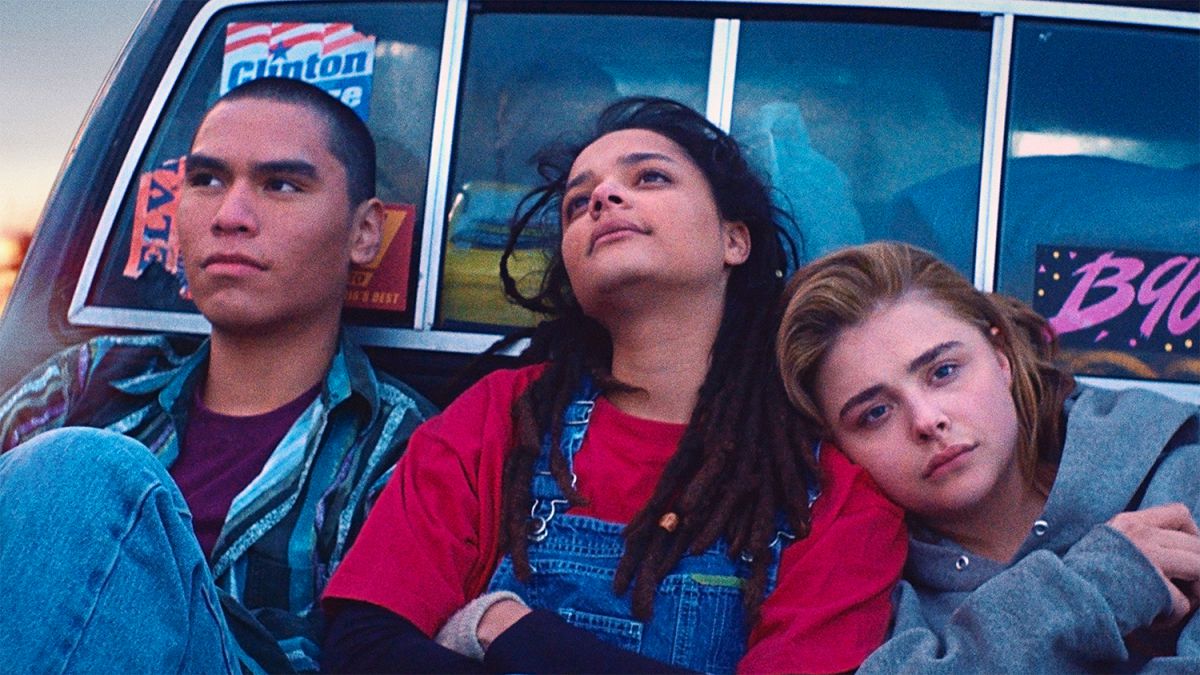
“I’m tired of feeling disgusted with myself.”
“Maybe you’re supposed to feel disgusted with yourself when you’re a teenager.”
With these lines, the characters of Desiree Akhavan’s The Miseducation of Cameron Post make a bold statement. Forced into a conversion therapy camp run by a brother-sister duo who are more incompetent than malicious, we follow these teenagers in a tumultuous time in their lives. Sure, the forest is lovely and offers a reprieve from religious teachings, the care is perfectly adequate and free of physical abuse, and their peers act as though they’re all determined to help each other attain the beauty of a life without the sin of same-sex attraction (SSA). But as Cameron Post (Chloë Grace Moretz) emphasizes to a caregiver late in the film, “How is programming people to hate themselves not abuse?”
Akhavan and co-writer Cecilia Frugiuele explore the ways in which conversion therapy is as dangerously alluring as it is overwhelmingly damaging to those who buy into its promise of salvation. This isn’t the colorful satire of But I’m a Cheerleader, but rather an even-handed approach to what conversion therapy looks like for these specific people. Where Emily M. Danforth’s equally marvelous novel covers Cam’s life from the summer of 1989 to her time in the conversion therapy camp God’s Promise in 1993, the filmmakers cut out nearly everything but her experiences at the camp and the incident at Homecoming that landed her there.
At God’s Promise, Akhavan paints an engrossing portrait of lost souls, people trying to do what they think is right and failing miserably at it. The idea of being fixed, of being free from self-loathing, is appealing. Being forced to confront this can lead down a number of paths: convincing oneself that they’re free of SSA, rejecting the notion that they’re a sinner entirely and living freely in rebellion of these false teachings, or killing themselves because they’ve been conditioned to hate themselves. This isn’t exaggeration, this is simply reality for the people who are brought here by relatives under the guise of concern.
And those who run the camp are forced to maintain that guise of concern. Where characters joke about how Dr. Lydia Marsh (Jennifer Ehle) is their very own Disney villain, the camera reveals something far more dangerous than that: a woman who assumes that her method of treatment is not harming people, but saving them. Her brother, Reverend Rick (John Gallagher Jr.), is her “success story,” a gay man who has convinced himself that he is free from his SSA. Neither person is a monster, or a saint. Rick, in particular, is a lot like the other queer people in this camp: an individual struggling to survive under the beliefs they’ve been forced to swallow.
The fact that anyone must suffer because of those beliefs is heartbreaking, but to surrender is to lose oneself entirely. Akhavan creates an atmosphere of overwhelming melancholy in God’s Promise, a place that is bound to traumatize anyone without the drive to resist inside them. Jane Fonda (Sasha Lane) and Adam Red Eagle (Forrest Goodluck) are a comforting presence as kindred spirits: somewhere between aloof and jaded, allowed to hike frequently (as a gender-neutral sport), growing/smoking weed without the knowledge of others, and joking constantly about the bullshit therapy they’re forced to go through. These are the people that tie Cam to a sense of normalcy, reminders that a little self-loathing is good for you and that singing 4 Non Blondes’ “What’s Up?” is going to make the day a little more bearable. They’re reminders that a life built around hating who you are will never result in something positive.
Cam is drawn to trying to fix herself, as any teenager would be when faced with a constant assault of self-doubt by those around her. In working with Moretz (who is at her absolute best here) and cinematographer Ashley Connor, Akhavan captures all the nuances of being queer and restless. It’s in the empty gazes while trying to imagine what sex would be like with someone you’re not attracted to. It’s in the hands gripping the phone when you’re talking to someone you thought loved you. It’s in trying to laugh away a moment of discomfort.
This extends to all of the queer people existing in God’s Promise. Through the supporting cast, both Cam and the audience are able to see what comes of denying one’s true self: a bubbling resentment of the self, leading to self-harm and regretful sexual interactions, among other things. They’re sold the idea that faith can save them, but there’s no room for God in a place that traumatizes teenagers and leads them down a damning path. Akhavan approaches the intersection of queerness and faith from the agnostic (or arguably atheistic) point of view of her protagonist. This is character who doesn’t actually know if she has any faith at all, but her peers are all starved for the comfort that a religious community provides. And though many queer people are people of faith and find comfort in religion (Stephen Cone’s nuanced depictions of religious characters in Princess Cyd and other films comes to mind), the film condemns the brand of misleading preaching that conversion therapy trades in.
So much of queer filmmaking and queer storytelling and queer existence is about finding and making your own family. The characters in The Miseducation of Cameron Post all exist in an odd limbo, some closer to finding comfort and community than others, but all hoping that they’ll attain some semblance of acceptance from those around them. It’s why one girl does karaoke nights with her peers, it’s why another does Blessercize and pretends to crush on one of her male peers, it’s why Reverend Rick sits at a table with Cam, Jane, and Adam, trying to poorly making conversion and engage with people who are like him.
When Akhavan holds a shot for what feels like an eternity on Rick, quietly sitting alone at a table only hours after bursting into tears when Cameron accuses him of not knowing what he’s doing, we understand why he’s not a monster. There’s an immense loneliness in denying who you are, and there is no success to be found in trying to build a community around that lie. By no means does the film work as an apologia for what God’s Promise and other camps like it are doing. But there’s something admirable in being honest about depicting people who buy into the promise that faith can save them instead of creating something that feels exploitative. There’s a beautiful optimism to a film so full of pain and an unabashed queerness and levity present that could only come from a filmmaker like Akhavan, who makes you enamored with and invested in Danforth’s characters in just 91 minutes.
—
Directed by Desiree Akhavan; written by Desiree Akhavan & Cecilia Frugiuele; based on the novel by Emily M. Danforth; starring Chloë Grace Moretz, Sasha Lane, Forrest Goodluck, Jennifer Ehle, and John Gallagher Jr.; 91 minutes.



 Derek
Derek
 Isabelle
Isabelle